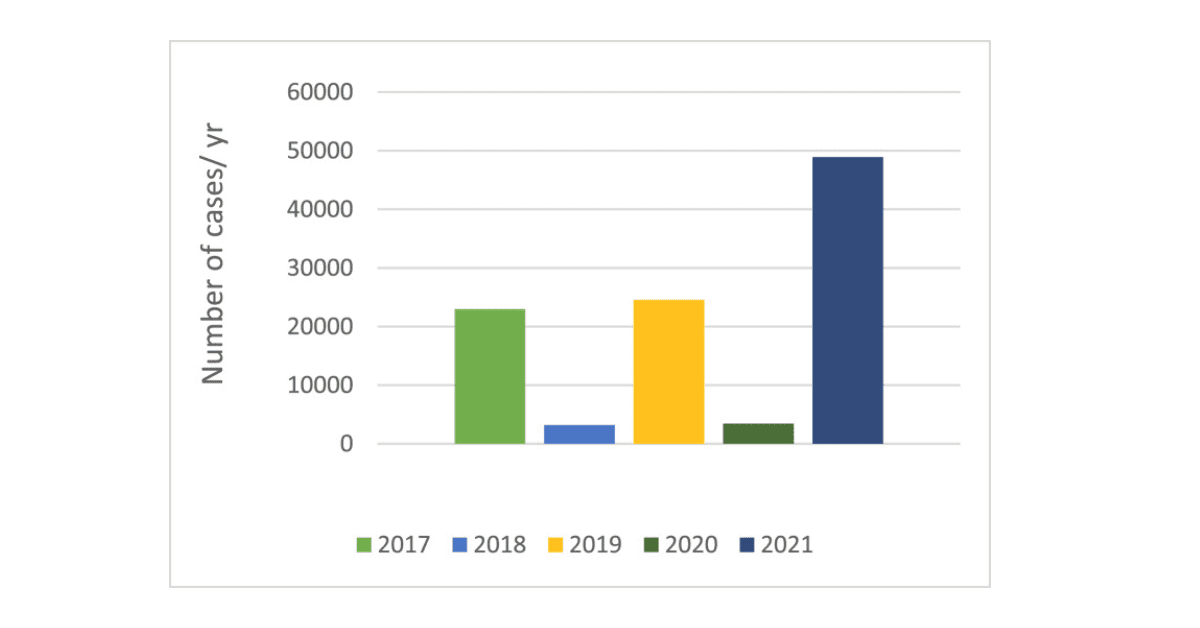Every year thousands of Pakistanis suffer from the deadly dengue virus and this has been going on for more than two decades. The World health organization (WHO) encourages everyone to learn how dengue spreads so people can protect themselves effectively.
The cause behind the recurrent dengue outbreaks is primarily the floods that occur during the monsoon season. Since Pakistan is facing some major floods in various cities it is better to be cautious.
According to a report, 48,906 cases including 183 deaths have been reported in Pakistan in 2021, and the situation is highly alarming due to rising cases.


“Pakistan is currently facing two outbreaks, dengue and COVID-19; both have strained its healthcare system resulting in multiple concerns including the co-diagnosis of two,” says research done on Dengue and COVID-19 in 2022
Here is how dengue spreads:
Dengue fever is mostly transmitted through the bite of infected Aedes mosquitos, including Aedes aegypti and Aedes albopictus.
When a mosquito bites a person who has dengue in his or her blood, the mosquito becomes infected. After approximately a week, the mosquito can transmit the sickness to another person by biting them. This is how dengue spreads. The dengue mosquito lays its eggs in water collected in any area like a tub, bottles, or even in tyres.
Consult the Best Doctor for Dengue Fever in Islamabad through Marham.
If you live in an urban area, you are more at risk of getting infected by the dengue virus as they thrive better there. The adult mosquitoes normally hide in dark areas around the house like under the beds, in cupboards, or behind sofas.
The Centers for Disease Control and Prevention also explain that a pregnant mother who is already infected with dengue might transmit the virus to her fetus throughout pregnancy or shortly after birth.
However, there has only been one recorded case of dengue transmission through breast milk so far.
Dengue can be transmitted by blood transfusion, organ transplantation, or a needle stick injury in rare cases. You can also get infected by getting exposed to infectious blood, laboratories, or healthcare settings.
Also, learn about the Signs and Symptoms of Dengue Fever
Does dengue spread from person to person?
“There is no direct transmission of dengue from one individual to another”, says the New York State Health department. But a patient with the dengue virus can infect other mosquitoes who bite them.
During the period when the virus circulates and reproduces in the blood system, humans are known to spread the illness from one country to another or from one area to another.
How can you prevent dengue from spreading?
“The use of tetravalent dengue vaccine (CYD-TDV) has been the most effective so far in treating dengue infections,” says research on the prevention and control strategies of dengue.
But this vaccine is not easily available everywhere, so the WHO recommends that people take precautions themselves.
Some necessary precautions you can take to prevent the spread of dengue are:
- Even when indoors, use insect repellant.
- If available, utilize air conditioning when indoors.
- Check that your windows and doors are secure and free of holes. Use mosquito netting if sleeping rooms are not screened or air-conditioned.
- Wear long-sleeved shirts and long pants tucked into socks while going outside.
- Consult your doctor if you have dengue symptoms.
- Remove mosquito breeding areas to lower the mosquito population. Old cans and flower pots that gather rain are examples.
-
Book Online Dengue NS1 Antigen Test
If you feel you have dengue fever, you should consult a doctor for dengue treatment. Your doctor will examine your symptoms and indications, check your blood for signs of the dengue virus, and examine your medical and travel histories.
Read Also: 8 Best Fruits for Dengue Patients

